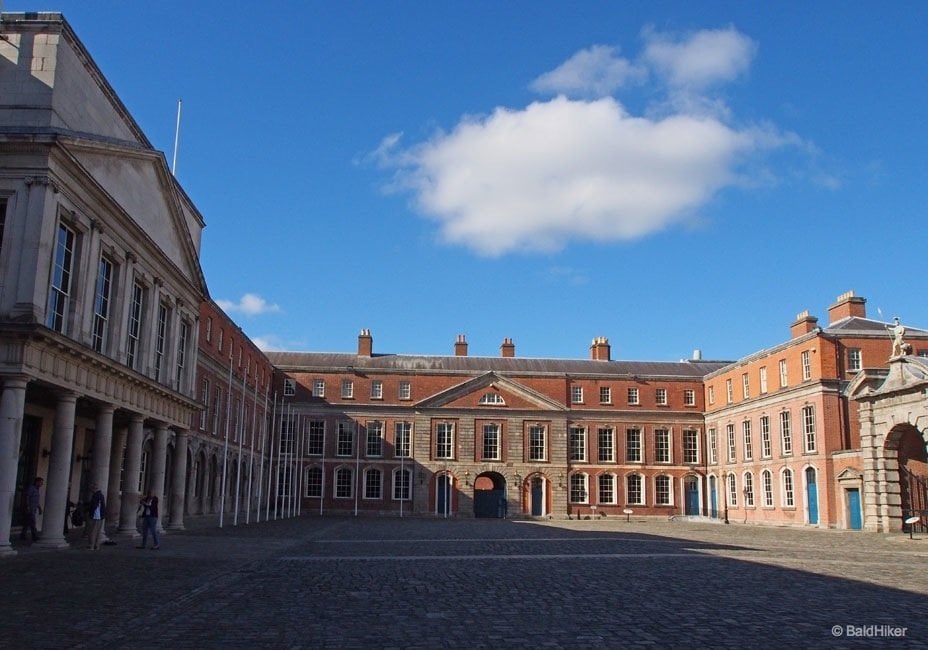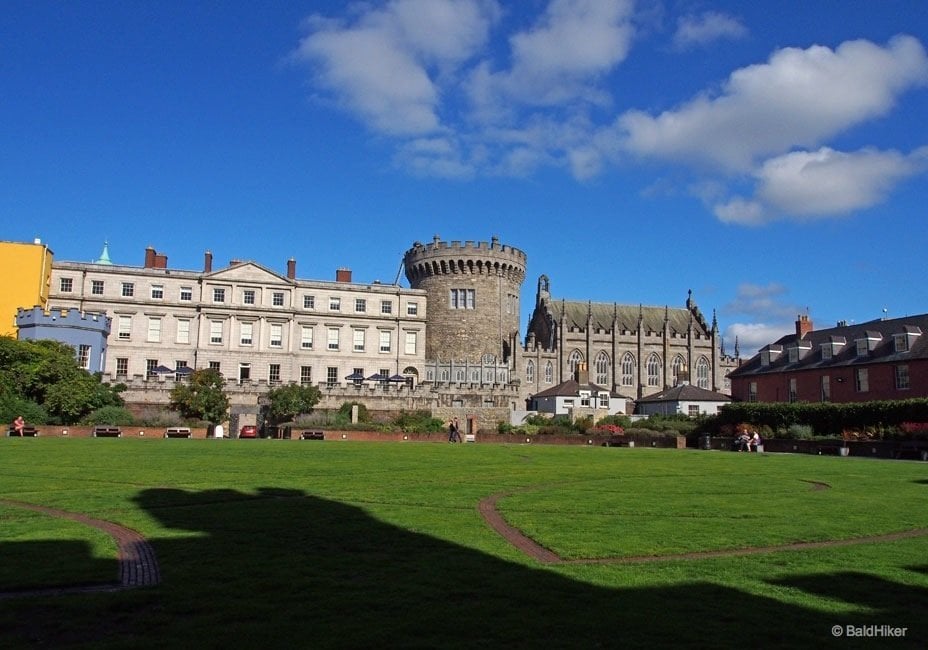When you hear the words “Dublin Castle,” you might picture towering stone walls, medieval battlements, and a fairytale keep.
But as I discovered on my walk through the city’s heart, the reality is far more complex—and fascinating. For over 800 years, this site has been the nerve centre of Irish history, evolving from a Viking settlement beside a “dark pool” to a grand Georgian palace that served as the seat of British power.
This isn’t just another stroll through historic grounds. This is a journey through the layers of Dublin itself. In this guide, I’ll walk you through not just the castle yards, but its incredible, multi-layered story.

We’ll cover everything from choosing the right tour to uncovering hidden gems, blending the official history with my own on-the-ground tips to help you have an unforgettable visit.
Dublin Castle at a Glance (Visitor Essentials)
For those of you who just need the key details to plan your day, here’s a quick-reference table with everything you need to know.
Dublin Castle at a Glance
Is Dublin Castle Worth Visiting? A Hiker’s Honest Opinion
Absolutely, yes. But it’s important to know what you’re visiting. If you’re expecting a classic medieval fortress, you might be initially confused.
What makes Dublin Castle a must-see isn’t its fairytale appearance, but its immense historical weight. This is where 700 years of Irish history were dictated, where revolutions were attempted, and where the new Irish state was born.
It’s a place of immense significance, and understanding its story is key to understanding Dublin.
For history buffs, it’s unmissable. For casual visitors, it’s a beautiful and surprisingly peaceful place to explore right in the city centre.

The History of Dublin Castle: From Viking Fortress to Irish Freedom
The story of the castle is the story of Dublin. It begins not with stone, but with water. The city gets its name from the “Dubh Linn” (or dark pool), where the River Poddle met the Liffey—the very spot where Vikings first established a fortress.
Norman Foundation
The castle we know today was officially founded on the orders of King John of England in 1204, intended as a formidable defensive fortification for the Norman city.

By 1230, it was a classic Norman courtyard design with four large circular towers at its corners.
The Great Fire and Transformation
A catastrophic fire in 1684 destroyed much of the medieval structure.
This event was a turning point, prompting its reconstruction into the grand Georgian palace and administrative complex you see today.
The Seat of Power
For over 700 years, this was the headquarters of English and later British administration in Ireland—the home of the Viceroy and the nerve centre of colonial rule.

A Nation’s Struggle
The castle was a focal point during Ireland’s fight for independence. During the 1916 Easter Rising, members of the Irish Citizen Army launched a failed attack on its gates, and leader James Connolly was later held prisoner here before his execution.
It was also the site of the infamous killing of three IRA members on Bloody Sunday in 1920.
The Handover
The castle’s long chapter as a symbol of British rule came to a dramatic end on January 16, 1922. On that day, it was formally handed over to Michael Collins and the Provisional Government of the new Irish Free State, a hugely symbolic moment marking the birth of an independent Ireland.

What to See at Dublin Castle: A Step-by-Step Tour
Walking the grounds is free, and it’s a fantastic way to spend an hour. Here’s a route that takes you through the key sights, just as I experienced them.
The Castle Yards (Upper and Lower): You’ll immediately notice the contrast between the two main courtyards. The Upper Castle Yard is formal and palatial, dominated by the grand Bedford Tower.
Look closely at the statue of Lady Justice—you’ll notice her back is turned to the city, a detail many have interpreted as a symbol of British justice in Ireland.
The Lower Castle Yard feels more historic, offering access to the Chapel Royal and the Chester Beatty.

The Record Tower (The Medieval Survivor): This is the highlight for anyone searching for the original castle.
The Record Tower is the only remaining medieval tower of the 13th-century fortress that’s visible above ground.
Dating from 1204-28, its walls are an incredible 4.8 meters thick. It has served as everything from a royal treasury to a high-security prison.
The State Apartments: These lavish rooms were the heart of the viceregal court, designed to project power and host grand events.
As you walk through, you’ll see the magnificent St. Patrick’s Hall, which is the grandest room in the castle and the venue for the inauguration of every President of Ireland.
The rooms are filled with priceless paintings and glittering chandeliers.

The Chapel Royal: This stunning example of Gothic Revival architecture was completed in 1814.
Take a moment to admire the intricate exterior, which features carvings of over one hundred heads, and the beautiful interior plasterwork.
It’s important to know that this area is typically only accessible if you take the guided tour.
The Viking Undercroft: For me, this is one of the most fascinating parts of the entire complex. This subterranean chamber takes you right back to the castle’s origins, where you can see the remains of the original Viking defence bank and a section of the medieval city wall.
This incredible glimpse into the past is also exclusive to the guided tour.
The Dubh Linn Garden & Chester Beatty: End your walk in the peaceful gardens, located on the site of the original “black pool”. The large Celtic-patterned lawn also serves as a helipad.
From here, you can also access the world-renowned Chester Beatty, a separate museum on the castle grounds that is free to enter and highly recommended.

Planning Your Visit: Tickets, Tours & Practical Info
Here are the essential logistics to help you plan a smooth and enjoyable visit.
Location, Opening Hours & Contact: The castle is located on Dame Street, Dublin 2, D02 XN27.
It is open daily from 09:45 to 17:45, with the last admission at 17:15. The castle is closed on December 25-27 and January 1.
Tickets & Prices: You can find the full price list for both guided and self-guided tours below, covering all ticket categories.

- Tours – The Critical Decision: The choice between a self-guided and guided tour isn’t just about having a guide—it’s about what you get to see.
- The “Access vs. Cost” Trade-off: A self-guided adult ticket is €8, while a guided tour is €12. For that extra €4, the guided tour gives you exclusive access to the most historically significant parts of the site: the ancient Viking Excavation and the stunning Chapel Royal. If you have a keen interest in history, the guided tour is essential and offers exceptional value.
- Booking Nuances: This is a crucial tip that can save you a lot of frustration. Self-guided tickets can be booked online in advance. However, tickets for the more comprehensive guided tour can only be purchased on the day of your visit at the castle’s ticket desk.
- Accessibility: The State Apartments, Chapel Royal, and gardens are all universally accessible. However, the Viking Excavation is only accessible via stairs and is not suitable for visitors with mobility challenges.

Tour Comparison: Guided vs. Self-Guided Visit
|
Feature |
Self-Guided Tour |
Guided Tour |
|---|---|---|
|
Price (Adult) |
€8.00 |
€12.00 |
|
Duration |
Approx. 30 minutes |
Approx. 1 hour |
|
Areas Covered |
State Apartments |
State Apartments, Chapel Royal, Viking Undercroft |
|
Booking |
Online in advance or on the day |
On the day only at the ticket desk |
|
Best For |
Visitors short on time or primarily interested in the palatial rooms and art. |
History enthusiasts who want the full story and access to the medieval/Viking remains. |
Beyond the Walls: What to Do Near Dublin Castle
One of the best things about Dublin Castle is its central location. Once you’re done exploring, you’re just a short walk from some of the city’s other top attractions:
- Chester Beatty: Located right in the castle gardens, this free museum houses a breathtaking collection of manuscripts, prints, and rare books from around the world.17
- Christ Church Cathedral: One of Dublin’s two medieval cathedrals, known for its beautiful architecture and historic crypt.
- Temple Bar: Dublin’s famous cultural quarter, with its lively pubs, galleries, and cobbled streets, is just a few minutes’ walk away.17
- Ha’penny Bridge: This iconic cast-iron pedestrian bridge, officially the Liffey Bridge, is a beautiful landmark and offers great views along the river.17








Absolutely nice scenery and beautiful post enjoyed your post emensly Paul.
Thanks John very much
Loved Dublin – and all of the Emerald Isle :-). Next up – Scotland. Thanks for sharing
🙂 Enjoy Suzanne
I love Dublin so much. Thank you for bringing back great memories with this post. Great pictures!
thank you for sharing this beautiful day in Dublin. very good photographs. Dublin castle is part of my tours and that’s really a place nobody should miss.if the weather is not so nice , you can always find shelter in the free and extraordinary museum of Chester Beatty Library next to the Castle’s gardens.thanks. Mireille
Beautiful photos and beautiful narrative, thanks for sharing. Dublin is definitely on my bucket list.
Hi Carri, that is so nice of you to say 🙂 Yes a definite place to go
Get pics, sounds like a fun trip!
Most certainly is a great place to visit Bob. cheers
awesome castle! love the photos…
Hi Kyra 🙂 Thank you